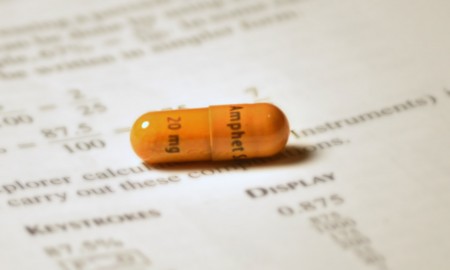
With finals week quickly creeping up on the calendar, some students are looking for the “any methods necessary” approach to buying extra time and focus for end-of-semester projects and last-minute studying.
For most students, time management, a healthy sleep schedule and personal organizations skills seem to do the trick when things get hectic.
However, some students choose an entirely different route altogether.
Their answer is taking Adderall (or “addies” in casual conversation) … a prescription drug used to combat the negative effects of Attention Deficit Hyperactivity Disorder (ADHD), narcolepsy, obesity, sleep disorders and severe depression.
According to the Spring 2012 National Collegiate Health Assessment of colleges in the U.S., nearly 8 percent of students reported using a stimulant of some kind during the course of the spring semester.
Former student Zachary Drye from Dalton, Ga., said while his extended use of Vyvanse (a drug similar to Adderall) to treat ADHD led to sleepless nights and chronic irritability, he did not want to stop others from using it.
“I had particularly bad experiences with the drug,” Drye said. “However, if someone thinks they need to take it for whatever reason, I say go for it.”
Adderall helps trigger the release of adrenaline from the adrenal glands, thus creating an increase in heart rate and blood flow to the body’s muscular system. The chemically-induced rush creates a renewed sense of energy and invigoration, which in turn often leads to improved focus and concentration – two highly sought after qualities needed for intense marathons of studying and finishing difficult tasks.
Since the drug is a Class II controlled substance (equivalent with cocaine and morphine), its use outside of a doctor’s prescription or unlawful transaction is strictly prohibited. However, this is not stopping students around the U.S., especially at Murray State, from using it as an assistant in the coming weeks.
Several sources who spoke on the condition of anonymity discussed using Adderall and other drugs as academic enhancers.
“It makes me feel like a ninja of productivity,” one individual said. “I can focus so hard that I barely even need to study” and “it makes me feel robotic.”
Finding the drug is the easy part. According to IMS Health, more than 2 million new prescriptions of Adderall for students aged 10 – 19 are written every year based on diagnosed cases of ADHD, and as they age out of high school and into the college realm, they bring their prescriptions with them.
Said one student about the availability: “People with ADD/ADHD don’t like the way their bodies react to their medication, so they happily sell it because they have no use for it.”
According to the Drug Enforcement Administration, the exchange of Adderall can carry a stiff penalty – up to a felony should prosecution push for as much. However, most cases during this time either go on unbeknownst to third-parties or are simply ignored by proper authorities.
When immediately coming down from the effects of Adderall instead of slowly lowering the dosage, users generally report a loss of appetite, a sense of tiredness, irritability and feelings of depression. Other symptoms such as cottonmouth, difficulty sleeping and headaches have also been reported with short-term use and quitting the substance “cold turkey.”
Extended use of Adderall has been known to cause cardiovascular problems, not to mention psychological and/or physical dependencies forming as the levels of dopamine in the brain remain high while the drug is regularly administered.
As the argument rages on through academia and research facilities around the world, numerous studies have been conducted surrounding the effects of stimulants on students with and without ADHD.
One particular study, conducted at Louisiana State University in 2010, produced some unique information surrounding the drug’s extended use.
“Although most study habits of ADHD students did not differ from controls, their high school and college GPA (grade point average), and ACT scores were significantly lower, and they withdrew from significantly more classes than did control students,” the study showed. “Interestingly, preliminary data suggested that good study habits alone, even without stimulants, could overcome the achievement disparity of ADHD students.”
Any students who suffer from adverse effects from the medication should contact Interim Associate Director for Health Services Judy Lyle at 809-3809 or visit Health Services located in Wells Hall.
Story by Edward Marlowe, Staff writer.
FDA Approved methamphetamine for children through young adults.
Interesting read…unsure about some info though…
*cough* *cough* BULLSH** *cough* *cough*.
From my experience I can say that this stuff works. The only thing that I found makes prolonged use bad is that you don't want to eat and it's easy to build a tolerance.